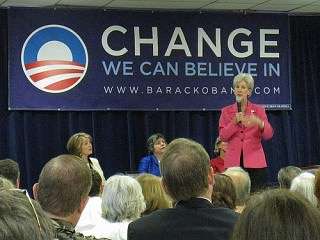Polls Show Opposition to ObamaCare Is on the Rise Again

When Florida Governor Rick Scott, a prominent Republican opponent of ObamaCare, decided that his state would participate in the health law's Medicaid expansion, the law's liberal backers responded triumphantly. Think Progress wondered if Scott's decision might serve as a model for others. Ezra Klein wrote a post declaring that "ObamaCare is winning."
If so, it's a limited win, at best. And it hasn't won with the public. The public remains divided and skeptical about the law and its effects. ObamaCare has always struggled in the court of popular opinion, and two new polls highlight the public's continued lack of support for the law. Indeed, after a brief post-election rise in support, public opposition to ObamaCare is on the rise again.
February's Kaiser Family Foundation health tracking poll puts opposition to the law at 42 percent and support at 36 percent; in Kaiser's November poll, 43 percent said they supported the law and 39 percent opposed it.
A newly released Reason-Rupe poll offers some confirmation that more Americans hold negative views of the law. Asked an open-ended question about what comes to mind when they hear the term "ObamaCare," 50 percent gave a negative response of some sort. At 24 percent, the largest single response was a generalized comment that the law is a bad thing.
Overall, the poll shows pessimism about the law. Asked about the law's impact on the country, meanwhile, 37 percent responded that ObamaCare made the nation worse off, compared to 31 percent who said it made the country better off. Another 24 percent said it made no difference, which suggests a large strain of indifference in addition to the positive and negative reactions.
Since the law passed, Democrats have (not surprisingly) tended to be much more supportive of the law than Republicans. That's still true, but Kaiser's poll finds that Democratic support has dropped substantially since last year's presidential election, from 72 percent in November to 57 percent in the February month's poll. That's the second weakest level of support Kaiser has found amongst Democrats since it began the monthly tracking poll in April 2010.
Why did support drop for the law in the months since the election? The parade of news stories about rising health premiums may have had an impact. The Reason poll reports that 26 percent of respondents believe the law will make it harder to afford coverage, compared with just 13 percent who think it will be easier.
In general, the news about ObamaCare has not been particularly encouraging this year. Yes, ObamaCare has successfully enticed several Republican governors into participating in its Medicaid expansion, but a majority of states won't participate in what is arguably the law's biggest innovation, the health insurance exchanges. But in the last few weeks, the Government Accountability Office just released a report highlighting the uncertainty about the law's budget projections, ObamaCare-friendly states have warned about the potential for health premium "rate shock," and the Congressional Budget Office has expressed skepticism about the law's implementation prospects. To me, at least, this sounds less like a law that is winning and more like a law is simply surviving.


Show Comments (88)